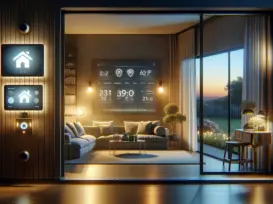Grus Home Energy - Smart locks
The Future of Home Security: How Smart Locks Offer Convenience and Enhanced Protection
The Future of Home Security: How Smart Locks Offer Convenience and Enhanced Protection
In today’s fast-paced digital world, the concept of home security is rapidly evolving. Traditional locks and keys are being replaced by smart locks, which offer a blend of convenience, control, and enhanced security features. Smart locks are keyless door locks that can be opened and locked using a variety of methods such as smartphones, biometric scans, or even voice commands. These innovative devices are transforming the way we think about keeping our homes safe.
One of the primary benefits of smart locks is convenience. Forget the hassle of fumbling for keys or making copies for guests; smart locks can be controlled remotely using a smartphone app. This means that you can lock or unlock your doors from anywhere, at any time. You can also grant temporary access to visitors such as house cleaners, dog walkers, or maintenance personnel without the need to physically hand over a key. Moreover, you can revoke access just as easily, which is a level of control that traditional keys simply cannot match.
Another crucial feature of smart locks is their ability to integrate with home automation systems. Many smart locks work with popular voice assistants like Amazon Alexa, Google Assistant, and Apple HomeKit. This integration allows for seamless operation within a connected smart home environment. Imagine being able to lock your doors with a simple voice command or having your doors automatically lock when your smart home system is set to ‘away’ mode. The possibilities for customization and automation are virtually limitless.
Smart locks also significantly enhance security. Many models come with built-in alarms and can notify you immediately if someone tries to tamper with the lock or force the door open. With traditional locks, it might be hours or even days before you realize there has been an attempt at unauthorized entry. In addition, smart locks often feature encryption and other security protocols to protect against hacking and unauthorized digital access.
Biometric features add another layer of security. Some smart locks include fingerprint sensors or facial recognition technology to ensure that only authorized individuals can access your home. This biometric verification is much more difficult to fake or bypass than a physical key, which could potentially be copied or stolen.
However, as with any technology, smart locks are not without their potential drawbacks. Concerns around digital security are valid, as the possibility of hacking does exist. However, manufacturers are continually improving encryption and security features to keep these risks to a minimum. It’s also important for users to maintain good digital hygiene, such as using strong, unique passwords and keeping their home Wi-Fi networks secure.
Another consideration is the need for power. Smart locks require batteries or a connection to your home’s electrical system to operate. While batteries can last for several months, it’s important to monitor their levels to avoid being locked out due to power issues. Some smart locks have fail-safe features, like the ability to use a traditional key or an external battery pack in case of power failure.
Smart locks represent a significant step forward in the realm of home security. They make life more convenient by allowing for keyless entry, remote access, and integration with other smart home devices. Their advanced security features provide peace of mind, knowing that your home is protected against both physical and digital threats. As technology continues to advance, smart locks are poised to become an indispensable part of the modern home, ensuring that security and convenience go hand in hand.
©2025 All Rights Reserved. Grus IoT Co.,Ltd.
